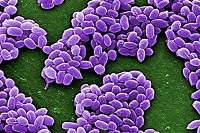 |
| Bacillus anthracis bacteria magnified to more than 12,000 times their actual size.--Courtesy of Laura Rose and Janice Haney Carr/CDC |
MIT scientists have employed a harmless version of the anthrax-causing bacteria for drug delivery purposes, using it to insert drugs known as antibody mimics inside cells in the fight against cancer.
"Anthrax toxin is a professional at delivering large enzymes into cells," said MIT chemistry professor Bradley Pentelute in a university news release. "We wondered if we could render anthrax toxin nontoxic, and use it as a platform to deliver antibody drugs into cells."
They replaced the harmful sections of two anthrax proteins with so-called antibody mimics. This way the new cargo could be delivered using the bacteria's natural delivery system. As their name implies, antibody mimics are drugs that mimic the function of antibodies: binding to antigens.
The antibody mimics disrupted a protein responsible for chronic myeloid leukemia, as well as hRaf-1, a protein implicated in many cancers. Antibodies have been harnessed to treat breast cancer by disrupting receptors on the surface of the cell, but this new drug delivery method enables drugs to disrupt proteins inside of cells, opening up new possibilities and potential medications.
"Crossing the cell membrane is really challenging," Pentelute said in the release. "One of the major bottlenecks in biotechnology is that there really doesn't exist a universal technology to deliver antibodies into cells."
The experiments were performed using in vitro models. In vivo studies involving mice tumors are now underway, according to the news release. The study methodology and results were published in the journal ChemBioChem.
- read the university news release
- here's the paper in ChemBioChem